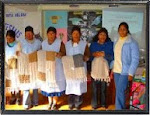In a society obsessed with instant gratification, novelty, and conspicuous consumption, it’s easy to dismiss fashion design as frivolous. Skirt lengths and platform heights appear inconsequential when juxtaposed with real-world concerns like climate change, economic strife, water shortages, and hunger and malnutrition. But if you consider the fact that clothing is something we envelope our bodies in every single day, to ignore the apparel industry’s environmental and social impact would be negligent, not to mention foolhardy.
$2 billion of hazardous pesticides are used every year to grow cotton—more than any other agricultural crop.
Clothing uses more water than any other industry besides agriculture. Conventional cotton, which is grown in more than 70 countries and comprises almost 50 percent of textiles worldwide, also happens to be the most toxic crop in the world. Roughly $2 billion of hazardous chemical pesticides are released into the air every year, accounting for 16 percent of global insecticides—more than any other agricultural crop. (To put this in context, it takes about a third of a pound of synthetic fertilizers and pesticides to grow enough cotton for a T-shirt.) The World Health Organization estimates that at least 3 million people are poisoned by pesticides every year, resulting in 220,000 deaths worldwide annually. In rural communities, where poverty prevents farm workers from taking the necessary precautions, miscarriages, premature births, and sickly children are rampant.
Like any good product design, clothing production can be accomplished in a better, smarter, and more socially and environmentally sustainable way.
Ecouterre is about changing people’s minds about what “fashion” design entails, beyond fleeting fads and mindless consumerism. Like any good product design, clothing production can be accomplished in a better, smarter, and more socially and environmentally sustainable way. And we’re not the only one’s who think so—organic clothing, produced without toxic pesticides and dipped in low-impact dyes, is gaining popularity across the globe. In 2006, retail sales of organic cotton products reached $1.1 billion globally—85 percent higher than the year before, according to the Organic Exchange. Organic cotton is by no means alone on the playing field. With improved technology, other strange and wonderful eco-fabrics have entered the fray, from salmon leather to fiber derived from milk.
We’re excited about the future of fashion design and think that it’s time for hardcore fashionistas and hardcore greenies alike to start paying attention to eco-fashion—and, more important, start engaging in dialogue with each other. We hope that Ecouterre will provide that forum, as well as pave the way to a smarter, more sustainable future.
Thursday, January 7, 2010
Tuesday, January 5, 2010
Fair-trade organic Indigenous Designs awarded YouTopia Grant

Starting a new decade and marking the beginning of its 15th year in business, Indigenous Designs has been awarded the Free Range Studios 2009 YouTopia Grant.
The organic, fair-trade clothing company will use the grant to demonstrate to the fashion world and conscientious consumers that how they spend their money is like voting with dollars and can have a positive effect on impoverished communities in the developing world and the planet.
“So many great companies in the competition had so many brilliant ideas that it’s a huge honor to be considered with them,” said Scott Leonard, CEO and co-founder of Indigenous.
“We couldn’t be more pleased that we won this grant to show our business model to the world as an effective, profitable way to do good things for people and the planet while producing high-quality, stylish fashions.
"The competition for this grant is a testament to a new kind of business leader rising to the challenge of environmental and social change. We're privileged to be trusted to take a leading role in the movement.”
Subscribe to:
Posts (Atom)



